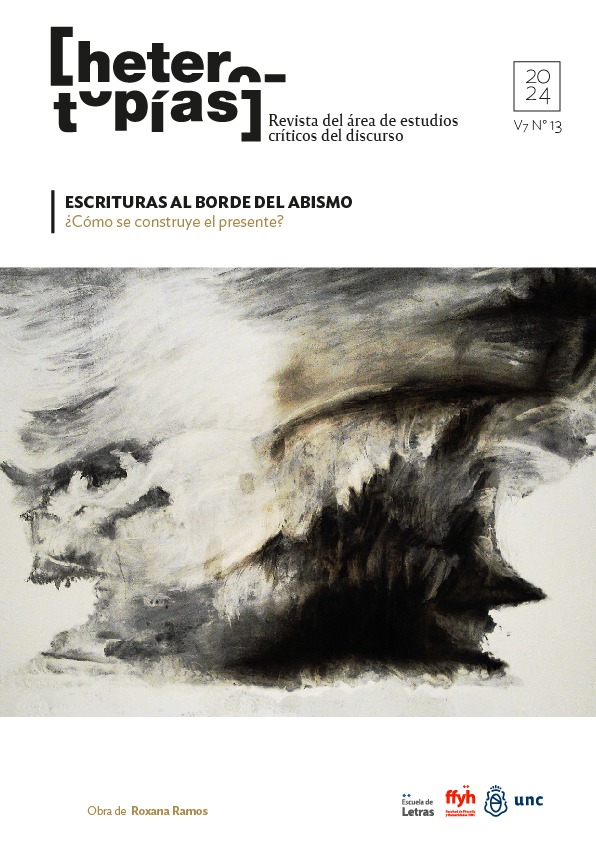Of transculturations and inventions: Édouard Glissant and the Caribbean in Relation
Main Article Content
Abstract
The study investigates three philosophical-critical folds of the concept of Relation proposed by the Martinican writer Édouard Glissant. The first moment links a counterpoint between the debates on transculturation in Latin America and the Caribbean with the narrative about Caribbean space-time narrated by Glissant. In a second moment, the philosophical frequency of the Relation is measured in discussion with Glissant's presences and absences within postcolonial criticism. The third section studies the impact of the concept of identity-rhizome within contemporary debates in Caribbean criticism. The work proposes a reflection that is based on the various works of the Martinican, understanding that the Relation hints at the possibility of studying the different rhythms, temporalities and experiences that break the identity architectures of coloniality. Finally, it is concluded that Glissant offers an image of the archipelago as an opening towards the multilingual and unpredictable nature of the Relation.
Downloads
Article Details

This work is licensed under a Creative Commons Attribution-NonCommercial-ShareAlike 4.0 International License.
Those authors who have publications with this journal, accept the following terms: Those authors who have publications with this journal, accept the following terms:
a. The authors will keep their copyright and guarantee to the journal the right of first publication of their work, which will be simultaneously subject to the Creative Commons Attribution - Non-Commercial - Share Alike (by-nc-sa) Attribution License; no commercial use of the original work or any derivative works is allowed, the distribution of which must be done with a license equal to the one that regulates the original work.
b. Authors may adopt other non-exclusive license agreements for the distribution of the published version of the work (e.g., deposit it in an institutional telematic archive or publish it in a monographic volume) provided that the initial publication in this journal is indicated.
c. Authors are allowed and recommended to disseminate their work through the Internet (e.g. in institutional telematic archives or on their website) before and during the submission process, which may lead to interesting exchanges and increase the number of citations of the published work. (See The effect of open access).
How to Cite
References
Benítez Rojo, A. (1998) La isla que se repite. Barcelona: Editorial Casiopea.
Brathwaite, E. K. (1974) Caribbean Man in Space and Time: A Bibliographical and Conceptual Approach. Kingston: Savacou Publications.
Browne Sartori, R. (2018). Semiosis antropófoga: semiótica, comunicación y postestructuralismo. Temuco: Editorial Universidad de La Frontera.
Chambers, I. (1994) Migración, cultura, identidad. Buenos Aires: Amorrortu.
Chánce, D. (2002) Édouard Glissant, un “traité du déparler”. Essai sur l'œuvre romasque d’ Édouard Glissant. París: Éditions Karthala.
Chow, R. (2014). Not like a native speaker: on languaging as a postcolonial experience. Columbia: Columbia University Press.
Claro, A. (2012) Las vasijas quebradas. Cuatro variaciones sobre “la tarea del traductor”. Santiago: Ediciones Universidad Diego Portales.
Clifford, J. (2008). Itinerarios transculturales. Barcelona: Gedisa.
Deleuze, G.; Guattari, F. (2002) Mil Mesetas. Capitalismo y Esquizofrenia. Valencia: Pre-textos.
Drabinski, J. E. (2019) Glissant and the Middle Passage: Philosophy, Beginning, Abyss. Minneapolis: University of Minnesota Press.
Ette, O. (2008) Literatura en movimiento. Madrid: Consejo Superior de Investigaciones Científicas.
Ette, O. (2011). “Introducción”. En O. Ette, W. Mackenbach, G. Muller y A. Ortiz Wallner (eds.) Trans(it)Areas. Conviencias en Centroamérica y el Caribe. Un simposio transareal (pp. 9-16). Berlín: edition tranvía-Verlag Walter Frey.
Glissant, É. (2010) El discurso antillano. La Habana: Fondo Editorial Casa de las Américas.
Glissant, É. (1969). L’Intention poétique. París: Editions du Seuil.
Glissant, É. (2002) Introducción a una poética de lo diverso. Barcelona: Ediciones del Bronce.
Glissant, É. (2004) Sol de la Conciencia. Barcelona: ElCobre Ediciones.
Glissant, É. (2006) Tratado del Todo-Mundo. Barcelona: ElCobre Ediciones.
Glissant, É. (2014) O pensamento du tremor. La Coheé du Lamentin. Juiz de Fora: Editora UFJF.
Glissant, É. (2017) Poética de la relación. Bernal: Universidad Nacional de Quilmes.
Glissant, É. (2019) Filosofía de la relación: poesía en extensión. Cuidad Autónoma de Buenos Aires: Miluno Editorial.
Hall, S. (2008) “¿Cuándo fue lo poscolonial? Pensar el límite”. En S. Mezzadra (comp.) Estudios Poscoloniales. Ensayos fundamentales (pp. 121-144). Madrid: Traficante de Sueños.
Mignolo, W. (2010) Desobediencia epistémica: Retórica de la colonialidad, lógica de la colonialidad y gramática de la descolonialidad. Buenos Aires: Ediciones del Signo.
Moraña, M. (2017) Transculturación y latinoamericanismo. Cuadernos de Literatura, 21(41), pp. 156-163.
Ortiz, F. (1987) Contrapunteo cubano del tabaco y el azúcar. Caracas: Biblioteca Ayacucho.
